Death in the Nut: A Parable of Mortality
Reading Time: 10 min
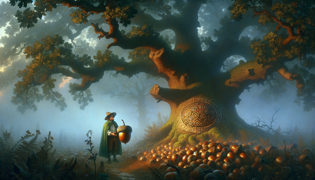
About Story: Death in the Nut: A Parable of Mortality is a Parable from united-kingdom set in the 19th Century. This Descriptive tale explores themes of Wisdom and is suitable for All Ages. It offers Moral insights. A sombre tale from the British countryside that reminds us of life’s fleeting nature.
Introduction
Autumnal mist curled through the hedgerows of Little Cleeve, creeping like a curious cat along ancient stone walls. The air tasted of damp earth and woodsmoke, lingering on the tongue with the warmth of a dying ember. Cobblestones gleamed with a sheen of early morning dew as the sun yawned above the horizon, brushing the sky with pale copper. In the heart of the hamlet, thatched cottages huddled together as if for comfort, their windows aglow with lantern light. Smoke drifted from crooked chimneys, leaving a faint scent of peat mingled with roasting chestnuts. Footfalls echoed over worn cobbles as villagers slipped out, baskets in hand, drawn by the promise of acorn gathering before the cold truly set in.
By midmorning, the wood beyond the village green lay awash in russet and gold. Leaves rattled like quiet applause above bowed heads. The gentle murmur of a distant stream wove through the hush, a lullaby for restless souls. “Mind you don’t wander off,” called old Fergus to his granddaughter, Eloise, as she dashed between gnarled roots. Her boots sank into damp moss, each suction releasing the faint aroma of pine resin. The chill prickled her cheeks, sharper than a schoolmaster’s rebuke.
As they filled their baskets, a hush fell when Eloise spied a single acorn larger than the rest. It lay nestled at the base of a venerable oak, its shell etched with spirals like the coils of time. Fingertips trembling, she cradled it, finding its surface unnaturally smooth and cool, almost like ivory carved by unseen hands. A sudden hush of wings swept overhead; crows croaked in warning, their voices as bleak as winter’s first frost. Villagers halted mid‑task, glancing skyward, sure that jittery birds forewarned some dark turning.
Thus began a day that would rend the simple cadence of harvest, for none guessed that within this humble nut lay a reflection of all that lives and dies.
The Gathering
Early one blustering October dawn, the villagers of Little Cleeve spilled from snug cottages into the dew‑soaked woodlands, foraging among gnarled oaks laden with acorns. Their wicker baskets swung like rusted bells across their backs, each step stirring the gentle rustle of bracken and the distant bleat of a solitary sheep. Matilda, the grey‑haired matriarch, stooped beneath a sprawling bough, her gnarled fingers closing around a cluster of perfect nuts, polished like amber marbles. Young Thomas chased after stray seeds, his boots squelching in peat‑black moss, his cheeks as ruddy as cherries in the crisp air. A tang of pine resin clung to every breath, while the faint murmur of a stream tinkled nearby, as familiar as a mother’s lullaby.
“Don’t dawdle, love,” Matilda called, her voice brittle as autumn leaves, “or we’ll be left high and dry come sundown.” Each villager moved with solemn purpose, mindful of the waning daylight. Leather straps bit into sun‑warmed shoulders that ached with quiet satisfaction. Nearby, the blacksmith’s anvil sang a metallic chorus, its echoes rippling through the glen like distant thunder. One acorn lay untouched at the base of a knotted root, larger than the rest and etched with tiny spirals—as if time itself had etched its skin. It gleamed with an unearthly sheen, smoother than polished bone, drawing every eye with the insistence of a secret long buried.
Thomas knelt to inspect it, breath caught like a moth in a glass. His fingertips brushed the ridges, and he caught a faint whiff of damp leather mingled with smoke from distant hearths. Villagers exchanged glances more solemn than a churchwarden’s glare. Old wives murmured prayers on their breath, half convinced the nut would speak in some ancient tongue. Church bells tolled in the distance, each peal a steady reminder that time, like acorns, falls inevitable and unheeded. They carried home their harvest weighed down by wonder and an unspoken dread, unaware that this single nut would crack their comforting illusions and awaken them to life’s fragile hearth-flame.
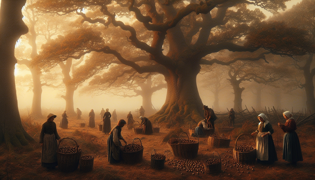
The Mysterious Acorn
Word of the singular nut spread through Little Cleeve like a spark across dry thatch. By afternoon, half the village had returned to the old oak, each hoping to glimpse that miraculous seed. Gossip flared in hushed tones—a local idiom of ‘climbing the wrong tree’ seemed apt for those chasing superstition rather than sustenance. Mrs. Pevensie, whose hands were knotted with arthritis, claimed she saw the shell pulse with a living heartbeat. Young Sam swore he heard an inner whisper telling him to look upon his own reflection and tremble.
As shadows lengthened, the hamlet’s blacksmith, Walter, hefted the nut on his anvil, seeking to crack its secret with steel. Sparks leapt like fireflies from his hammer, and in each flash the villagers glimpsed possibilities—of fortune, longevity, resurrection. Yet when Walter struck, the shell held firm, resisting the chisel’s kiss. Every blow sent shivers through brittle eve air, like the brittle clatter of bones when winter’s frost arrives unannounced.
Nightfall found the gathering drawn around torches flickering orange against the encroaching gloom. The scent of burning pine resin stung nostrils, and the crackle of flame sounded like distant applause. All agreed the nut defied mortal laws; it was neither food nor ornament, but some portent wrapped in a tiny husk. Beneath its surface lay a gravity that bent common sense: a reminder that life, for all its chatter and bustle, hinges on the thinnest of shells. Stars drifted overhead, distant as lost dreams, while villagers dared each other to touch that black‑etched spiral before retreating in awe.
Amid whispered theories—of witches’ curses, of buried treasure, of immortality’s essence—none guessed that with every hopeful murmur they stood before a mirror of their own mortality. This small husk, they did not yet realise, would be the flint that sparks the greatest reckoning they could not evade.
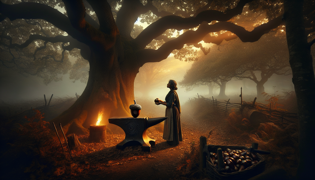
The Hermit’s Counsel
When the village bells tolled the hour of compline, a stranger appeared at the edge of the green: a hermit draped in ragged cloak, eyes like polished jet. He moved with deliberate grace, as quiet as a cat in the lane. No one recognised him, though old tales spoke of such solitary wanderers giving counsel when omens ran high. He carried a pouch of strange herbs and a staff knotted with old runes. The villagers eyed him warily, half-expecting a conjurer or a madman.
Fergus stepped forward. “What brings you here, stranger?” he asked, voice as creaky as the lane gate. The hermit inclined his head. “I come bearing truth,” he murmured, “not all gifts welcome in daylight. That nut you prize holds more than mere memory of blossom and leaf.” He tapped the shell with a gnarled finger; sparks of blue light flickered where flesh met wood. A hush fell so deep the distant echo of a falling leaf sounded like a cannon blast.
“Within every seed lies the skeleton of origin and end,” he proclaimed. “You pluck it as one would hope for life eternal, yet fail to see that in its marrow rests the promise of ruin. You are gobsmacked by its promise, but death is the kernel at its heart.” A shudder ran through the circle; mothers clutched children closer, and men gripped their tools in sudden dread. The hermit laid a trembling palm on the shell, muttered a phrase older than the village walls, and the nut cracked, hairline fractures spidering across its surface like pale lightning.
Silence reigned while villagers peered through rent bark, expecting diamonds or wormwood. Instead they saw a tiny bleached skull, its hollow eye sockets empty yet brimming with meaning. A single drop of dew glistened within one socket, as cold and clear as a frozen tear. The hermit’s voice softened: “No power to cheat the final harvest remains here. Understand this: every ending nests inside a beginning.” With that, he turned and disappeared into the gloom, leaving behind a hush heavier than any midnight gale.
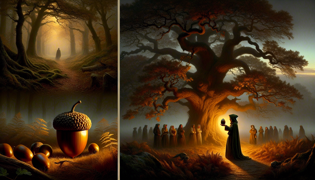
The Reckoning
In the days that followed, Little Cleeve wore a cloak of contemplative silence. Doors stayed closed until noon; shutters remained partially drawn. The uncanny discovery at the hermit’s hands had shifted the village’s heartbeat, much like turning the final page of a cherished book. Children tiptoed past the oak’s ancient roots; even the birds seemed reluctant to roost there, their calls softer and more hesitant.
Matilda dreamed of blossoms turning to dust, of every tender sprout ripening to withered husk. Thomas awoke each dawn haunted by the echo of cracking shell and thought of his own frail flesh. Fergus paced the green, every creak of timber and tinkle of distant bells a cruel reminder of time’s unrelenting march. Each found themselves drawn back to that old oak, as though tethered by some iron chain of destiny. They bent to study the splintered acorn fragments, each shard a testament to life’s brittle frame.
Then, at dusk on the third day, the hermit returned. He found them gathered in respectful melancholy. Without a word, he lifted a fragment from the mossy earth and held it aloft. “This,” he said softly, “is the face of fate. Fear it not, for every tree that bears fruit will one day yield to seasons’ turn. Embrace the truth that life’s flame flickers brightest when its wick is shortest.” He placed the fragment in a humble wooden box and sealed it. “Carry this lesson in your heart as you do your daily bread.”
No thunder cracked, no lightning split the sky. Instead, an owl hooted once, as if offering benediction. Villagers found themselves already changed, their earlier greed for earthly certainties replaced by quiet gratitude for each breath. They left the hermit’s words to settle in the hush between heartbeats, aware that death was no enemy but the hushed partner to every new dawn. And so, beneath leaf and loam, they buried the tiny skull, returning it to the soil that had first cradled the blossom. The acorn’s secret remained entombed, a silent teacher for those who dared to gather wisdom alongside their harvest.
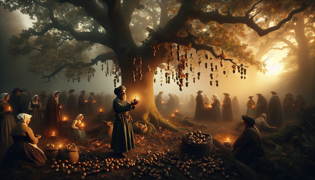
Conclusion
Winter’s first frost found Little Cleeve quieter, yet somehow more alive. In hushed homes where once tables groaned under acorns, families now shared stories of that solitary nut and its whispered truth: death is woven into every living thing. No one spoke of fearing the dark, for they had learned that night’s embrace gives shape to dawn’s promise. In the years that followed, the oak where it all began bore witness to seasonal turns—buds bursting, leaves tumbling, bark cracking under ice—each cycle a testament to renewal and decline.
Matilda passed away in the spring, her gentle soul slipping away like steam from a teacup. Thomas grew into a steady man, his eyes always alert to the fleeting of petals on the breeze. Fergus hung the hermit’s wooden box on his mantle, empty now, save for a single acorn shell polished to smooth ivory. He would tap it thoughtfully when bells tolled, reminding all who called to him that every life, like that fragile shell, contains within its heart the truth of its own end.
So ends the tale of Death in the Nut—an unvarnished lesson from a humble village: that to live fully is to accept the hush that follows every breath. And in that gentle hush lies the quiet dignity of knowing one has danced between birth and dusk with eyes open to both wonder and farewell.

















